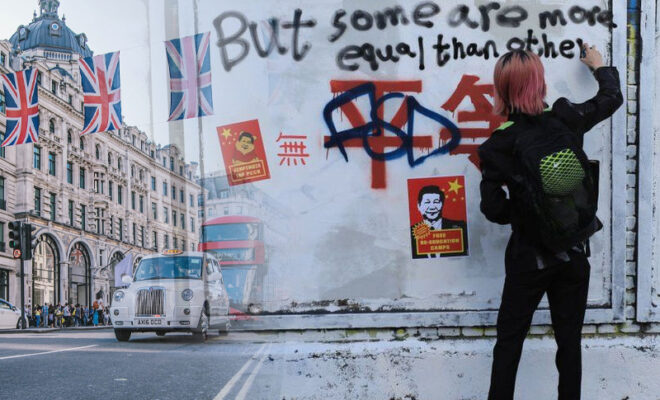Chinese Political Slogans Appear As Graffiti On London Street Art Wall

London’s famous street art hub, Brick Lane, has ignited a discussion due to a wall being covered with slogans promoting Chinese Communist Party ideology. Social media videos showed individuals spray-painting large red Chinese characters on a white background overnight.
These characters represent “core socialist values,” which are common political slogans under Chinese President Xi Jinping’s leadership. This kind of political propaganda with red characters on white walls is familiar in China.
However, the appearance of these slogans sparked a debate about whether they constitute street art. Quickly, people began adding new graffiti criticizing the Chinese government onto the wall.
Some added “no” in front of the slogans or posted other messages and images. This diverse range of opinions even included concerns about the covering up of existing artwork.
One of the creators, Wang Hanzheng, asserted that the piece had limited political significance. He explained that they used political elements as a way to spark discussions about various environments and perspectives.
He emphasized the importance of freedom and democracy in London, while also hinting at a need to explore socialism’s role.
However, the appearance of these slogans took a twist when people layered on top references to historical events such as the Tiananmen Square massacre and messages supporting the independence of Taiwan, Tibet, and the Uyghurs.
The mural soon became a platform for expressing dissent against Xi Jinping’s communist rule, creating a conversation about censorship, human rights, and freedom of expression in China.
ALSO READ: Taliban Bans Girls From Attending School Beyond Class 3 In Afghanistan
The local council eventually painted over much of the text. It seems that Chinese citizens are really struggling with the freedom of expression and the oppression of thought in China.
Plus, China’s exports are currently suffering the biggest drop in over 2 years. It has dropped by 14.5%, due to weak global demand. This is also hurting the economy and people’s lives in China.



